NFT Taxes by States
Pennsylvania’s Department of Revenue inaugurated the change by adding NFTs to its “taxability matrix” without providing any accompanying guidance.
Washington published an interim statement with definitions of key terms and a proposed schema for determining the “sourcing” of NFTs, or where, for tax purposes, related transactions physically take place.
Pennsylvania and Washington became the first states in the nation to explicitly list non-fungible tokens (NFTs) as digital assets subject to sales and use taxes.
Pennsylvania and Washington’s actions surrounding the taxation of NFTs are guidelines that interpret existing law rather than enactments of entirely new legislation. That means that they could be retrospectively applied, with a spokesperson for Pennsylvania’s Department of Revenue stating that it had the power to collect taxes on NFTs going back to 2016.
Washington’s more comprehensive statement suggests that NFT sellers will be expected to document the time and place of each transaction, and possibly the addresses of buyers. It defines NFTs, lays out which kinds are taxable, outlines how a vendor would tabulate their tax obligation, and gestures at how vendors might source the sale. The last item is the most ambiguous; currently, few vendors or marketplace platforms track who buyers are and where they’re located because these transactions use cryptocurrency. The new rules in Washington may transform industry practices by scaling back the anonymity that currently reigns supreme in NFT sales.
Federally, taxation rules surrounding NFTs are also incomplete. The Internal Revenue Service (IRS) has recognized cryptocurrency as property since 2014; any gains made from its use are liable to taxation.
As part of the Infrastructure Investment and Jobs Act signed into law in November 2021, President Biden imposed new reporting requirements for cryptocurrency transactions that would require businesses to collect additional information.
The IRS is going to issue further guidelines for the federal taxation of digital assets to specify how these new provisions are to be implemented.



